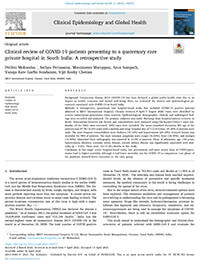Past events at MIOT
Clinical Review of COVID-19 by MIOT Hospitals
Here’s a Clinical Review of COVID-19 patients by MIOT Doctors published in Clinical Epidemiology and Global Health, a reputed medical journal. We believe these findings will help educate the general public on the importance of getting immediate medical attention during this surging second wave of COVID-19.
The general public is under the impression that the second wave of COVID-19 is different from the first wave. But, in reality, both the waves are similar in nature.
But, if you ask why the situation was less severe last year, it’s because the general public took a blood test and CT chest scan first; they never took a swab since there was a lot of stigma attached to COVID-19 in 2020. If there was no problem with the blood test and CT results, people stayed home. But if the results were indicative of active pneumonia, they got themselves admitted to a hospital immediately.
But this year, it is different. COVID-19 is not a stigma. So the public are taking the swab test. It is common knowledge that the first swab test will return a negative result. Only in the following days, will the result turn positive.
Whether they are symptomatic with a negative swab result or they are COVID-positive, people are choosing to stay home with a pulse oximeter hoping they can manage it themselves. It is only at the last moment that they go for a CT or a blood test.
When the CT and blood test results reveal Severe Pneumonia, the patient must get admitted to the right hospital immediately. Being COVID-positive doesn’t mean it is a severe state. But, if you have Severe Pneumonia with COVID-19, the mortality rate is high and recovery time is slow at times with extended hospital stay. This is very clearly explained in the article below.
Abstract from the MIOT Article:
Background: Coronavirus disease 2019 (COVID-19) has been declared a global public-health crisis due to its impact on health, economy, and mental well-being. Here, we evaluated the clinical and epidemiological parameters associated with COVID-19 in South India.
Methods: A retrospective, quaternary care hospital-based study that included COVID-19 positive patients admitted to MIOT International Hospital, Chennai between 8 April–7 August 2020. Cases were identified by reverse transcriptase-polymerase chain reaction. Epidemiological, demographic, clinical, and radiological findings were recorded and analyzed. The primary endpoint was stable discharge from hospital/patient recovery or death. Associations between risk factors and comorbidities were analyzed using Chi-Square/Fisher’s exact test.
Results: Of the 5264 cases reviewed, 3345 cases were included. The mean (standard deviation, SD) age of the patients was 47.58 (16.69) years with a median and range hospital stay of 5 (2–41) days. 69.20% of patients were male. The most frequent comorbidities were diabetes (37.10%) and hypertension (29.10%). Contact history was available for 58% of patients. The most common symptoms were cough (36.60%), fever (28.30%), and myalgia (15.40%). Abnormal chest radiography was reported in 16.9% of patients. Phase of admission, age ≥50 years, hypertension, diabetes, coronary artery disease, chronic kidney disease was significantly associated with mortality (p < 0.05). There were 142 (4.2%) deaths in this study.
Conclusion: In this single centre hospital-based study, late presentation and more severe form of COVID pneumonia lead to higher mortality although it had lower mortality rate for non-pneumonia COVID-19 in comparison. Late phase of the pandemic showed better outcomes vs. the early group.
The other difference is that we witnessed elderly people get infected last year. But this year, they got vaccinated. So a higher number of younger males between 40 and 50 are at a higher risk like last year as published in this article.
The difference in 2021 second wave is that even though patients may test positive after the vaccine, we are not seeing COVID pneumonia in these patients. This shows the importance of being vaccinated.
It also reveals that if you take a CT for COVID Pneumonia and blood test for COVID Severity early and if the results indicate that it is acute illness and you visit a hospital immediately, then it’s unlikely that it might lead to a bad outcome. But if you simply take a COVID-swab and stay at home measuring your pulse oximeterand come late to a hospital, by which time the condition has become severe, and it has badly affected your lung, then the outcome is very poor.
COVID per se does not mean you will get a severe disease if you test positive. But COVID with pneumonia means that it is a severe condition. Stay safe! We can beat this together.
Download the MIOT COVID Research article published in Global Epidemiology and Global Health

MIOT was one of the first hospitals to dedicate beds and personnel from the beginning of this pandemic for COVID-19 patients. So far, MIOT has treated more than 8500 COVID patients successfully since March 2020.



